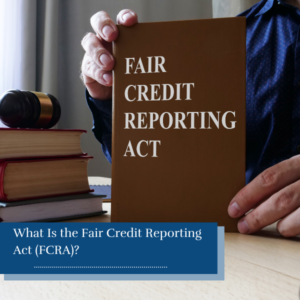What Is the Fair Credit Reporting Act (FCRA)?

The Fair Credit Reporting Act (FCRA) is a federal law that regulates how credit reporting agencies manage your credit information. The FCRA protects your credit data’s privacy, integrity, and validity. It is helpful to understand this law and what to do if your credit information is not correct.
Requirements of the FCRA
The FCRA requires credit reporting agencies, such as credit reporting bureaus or background check companies, and the entities that report consumer credit data to these agencies to ensure the accuracy and privacy of consumers’ credit information.
Obligations of credit reporting agencies under the FCRA include:
- Providing information in a consumer’s file on request by the consumer, with at least one free report annually
- Providing the consumer with the credit score calculated by the agency
- Investigating any credit data disputed by the consumer
- Correcting or deleting any incomplete, inaccurate, or unverified information within 30 to 45 days of receiving the consumer’s dispute
- Removing credit data after seven to ten years
- Restricting disclosure of a consumer’s credit file to entities who have a legitimate need for the file
- Withholding disclosure of credit information to employers unless the consumer consents
Entities who supply credit information to credit reporting agencies also have legal obligations under the FCRA, such as:
- Refraining from providing any information that an entity knows or should know is inaccurate
- Promptly updating or correcting any erroneous or outdated information supplied to a credit reporting agency
- Notifying a consumer of any negative credit information reported about them
- Notifying credit reporting agencies when a consumer voluntarily closes an account
- Maintaining reasonable procedures to respond to identity theft notices and refraining from reporting information about an account reported or suspected of identity theft
- Refraining from continuing to report information disputed as inaccurate until conducting an investigation
What Are My Rights Under the FCRA?
Consumers have various legal rights and protections afforded by the FCRA, including:
- The right to correct their credit file by disputing the accuracy or completeness of the information and to have inaccurate, incomplete, or unverified information removed from their credit file within 30 or 45 days
- The right to have negative credit information removed from their credit file after seven years (ten years for Chapter 7 bankruptcies)
- The right to request a file disclosure to receive all information in their credit file, with each nationwide credit reporting agency obligated to provide one free file disclosure every 12 months or after a consumer has a credit application denied, puts out a fraud alert, discovers inaccurate information due to fraud, receives public assistance, or plans to apply for employment within 60 days
- The right to ask for the credit score calculated by the credit reporting agency, although agencies may charge consumers to access their scores
- The right to notice of any adverse credit information used against you, such as to deny an application for credit, insurance, or employment; notice must include the name, address, and telephone number of the entity that supplied the information
- The right to consent to the disclosure of one’s credit file to an employer or prospective employer
Remedies for Fair Credit Reporting Act Violations
Any entity that has obligations under the FCRA may be subject to a state or federal lawsuit brought by a consumer who has suffered damages due to an FCRA violation. Federal courts usually require consumers to demonstrate tangible harm to file a lawsuit, such as denial of a credit application or taking detrimental action in reliance on a violation. Consumers with an FCRA claim must file their lawsuit within two years after the consumer discovers the violation but no later than five years after it occurred.
Contact the Bankruptcy Lawyers at Sasser Law Firm for Help
If you are interested in filing for bankruptcy please feel free to contact us. We offer free consultations. Our number is (919) 319-7400. If you need a consumer law attorney you may want to utilize the following attorney directory. https://www.consumeradvocates.org/findanattorney/
- About the Author
- Latest Posts
For more than 20 years, the Sasser Law Firm has been helping individuals and business owners sort through financial hardships to see the light at the end of the tunnel. Our North Carolina bankruptcy attorneys are all board-certified specialists, which means we have passed a complex exam, undergone a thorough peer review, and continue to earn legal education credits in this ever-evolving area of law.














